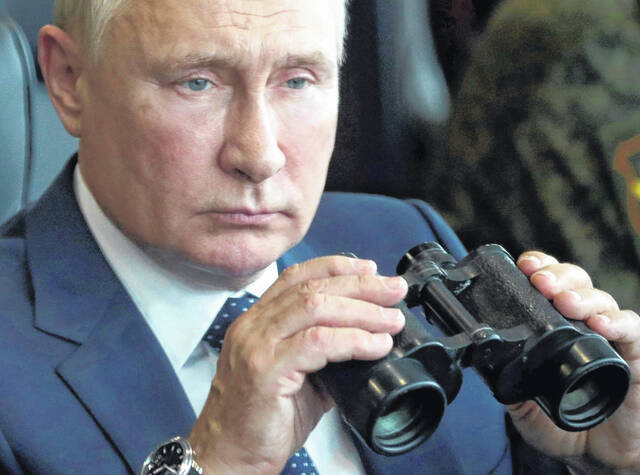The Chicago Tribune
In July, Russian President Vladimir Putin released a long-winded treatise on Ukraine — the country’s history both medieval and modern, its kinship with the Russian Motherland, and its latter-day relations with the West. Mixing truths with half-truths and outright falsehoods, it rested on the dominant theme that the notion of Ukraine as its own nationality, ethnicity, culture and language is a figment, and that Ukrainians and Russians have always been, and always will be, “one people.”
“I am confident that true sovereignty of Ukraine is possible only in partnership with Russia. Our spiritual, human and civilizational ties formed for centuries and have their origins in the same sources, they have been hardened by common trials, achievements and victories,” Putin wrote. “Together we have always been and will be many times stronger and more successful. For we are one people.”
The document was more than a monograph in need of a heavy edit. It serves as a veiled justification for what the former KGB agent has desperately wanted for years — the reabsorption of Ukraine into the folds of Moscow.
So far, it’s been an achievement that has eluded the Russian leader. Putin can claim credit for rescuing his country from post-Soviet economic doldrums and restoring Russia to a level of geopolitical prominence. By commandeering free media and neutralizing opposition — often through brutal means — he has cemented his place atop Russian governance for as long as he desires. Ukraine, however, remains for Putin unfinished business.
By amassing thousands of Russian troops near Ukraine’s border, Putin has sent a blunt message to the West. Submit to the Kremlin’s demand that Ukraine will never join NATO, or watch the tanks roll into Kyiv.
How to respond to Putin’s incendiary display of brinkmanship arguably poses President Joe Biden’s biggest foreign policy challenge to date. Biden can neither give into Moscow’s demand nor thrust NATO into direct military conflict with Russia. Kyiv economically and politically leans westward, but Ukraine isn’t a NATO member and therefore does not benefit from the “attack one, attack all” defense commitment that the military alliance applies to all of its member nations.
Ukraine is, however, a sovereign state with aspirations of joining NATO, and the U.S. and its European allies cannot simply allow Putin to steal land, cities and people with brute force in the same way he pilfered the Crimean peninsula from Ukraine in 2014.
Diplomacy armed with the cudgel of sanctions — punishment stronger than what was imposed on Russia after the Crimean annexation — is the best tack Biden can take.
Western leaders can only hope that Biden’s Dec. 7 video call with the Russian leader seeded the beginnings of a diplomatic solution out of this crisis. The message to Putin should be unequivocal. Neither Ukraine nor its people are the property of Russia. As a sovereign nation, Ukraine has license to forge its own domestic and foreign policies and pick its own allies — even if they belong to NATO. Military conflict must be avoided, but Russia should be warned that it faces the prospect of becoming a pariah state if it absorbs Ukraine the same way it swallowed up Crimea.
That’s a chapter in Russia’s history that Putin certainly would regret.





